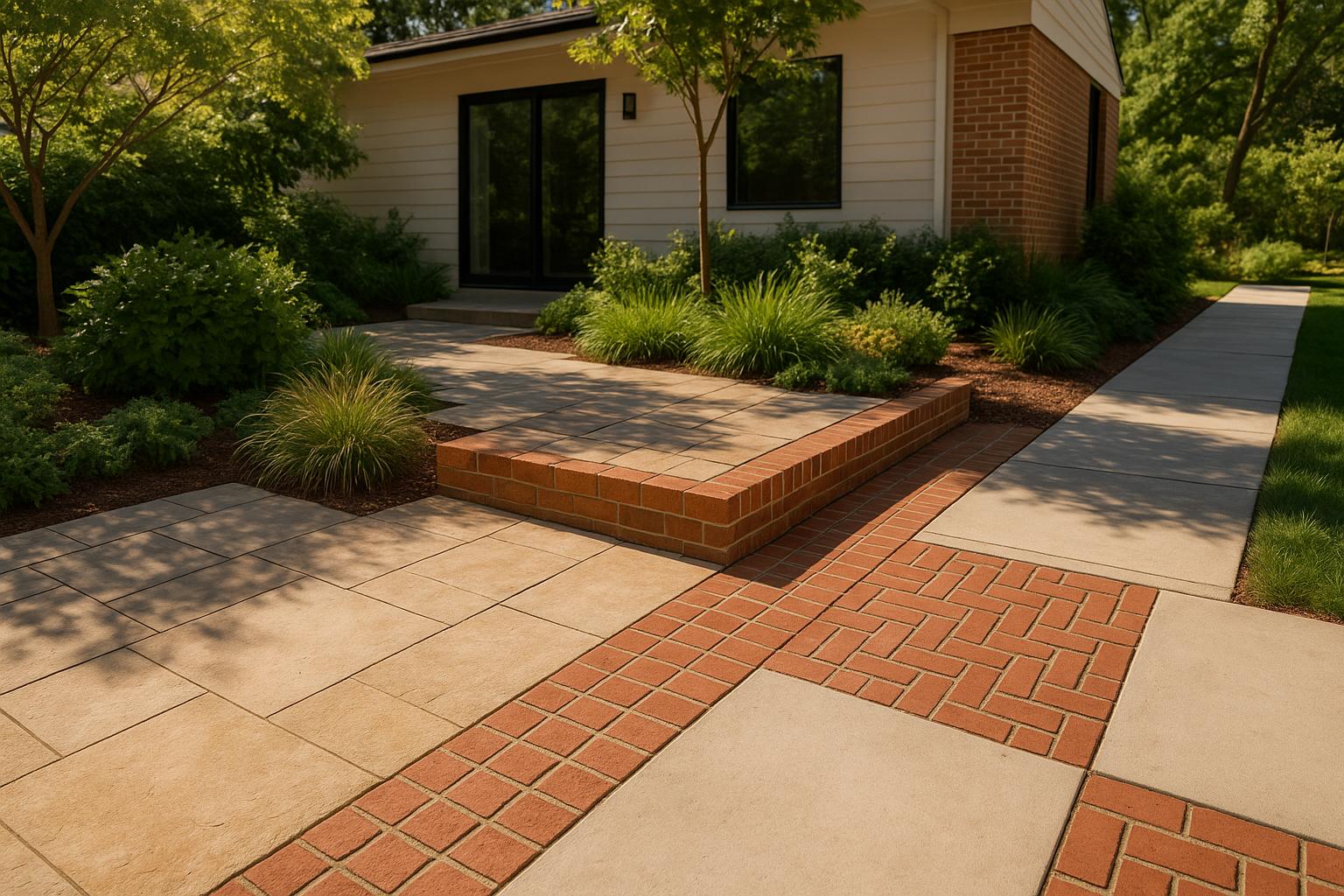- bhavya gada
- No Comments
When designing patios and walkways in Maryland, choosing heat-resistant materials is crucial to combat the region’s hot summers and freeze-thaw winters. The right materials not only stay cooler underfoot but also withstand UV exposure and extreme weather, ensuring durability and comfort. Here are five top options to consider:
- Travertine Natural Stone: Porous limestone that stays cool, handles freeze-thaw cycles, and offers timeless aesthetics.
- Aluminum Decking: Reflects heat, stays cool, and resists warping or buckling in extreme temperatures.
- PVC Decking: Synthetic material with heat-reflecting properties, moisture resistance, and low maintenance.
- Premium Composite Decking: Combines wood fibers and polymers for heat resistance, durability, and wood-like appearance.
- High-Grade Concrete Pavers: Strong, light-colored options reduce heat absorption and resist cracking during temperature shifts.
Each material has unique benefits, from comfort in the heat to long-term durability. Below is a quick comparison to help you decide.
Quick Comparison
| Material | Heat Resistance | Durability in Weather | Maintenance | Cost Estimate (per sq. ft.) |
|---|---|---|---|---|
| Travertine Stone | Stays cool underfoot | Excellent for freeze-thaw | Minimal | $12–$15 |
| Aluminum Decking | Reflects heat well | Resists warping and buckling | Low | $20–$28 |
| PVC Decking | Cooler with light colors | Moisture-resistant | Very low | $10–$15 |
| Composite Decking | Heat-reflecting design | Mold and crack resistant | Low | $8–$12 |
| Concrete Pavers | Lighter colors stay cooler | Handles temperature shifts | Moderate (sealing) | $3–$6 |
For best results, professional installation ensures proper drainage, stability, and durability, saving you from future repairs. Consider your specific needs – comfort, style, and budget – when selecting the right material for your outdoor space.
Doug’s Top 10 Materials for Outdoor Patios
1. Travertine Natural Stone
Travertine is one of the best choices for outdoor hardscaping projects, especially when heat resistance is a priority. This limestone-based material has a naturally porous structure that helps disperse heat, keeping surfaces cool and comfortable to walk on – even on the hottest days.
Heat Resistance and Surface Comfort
Maryland summers can get pretty intense, but travertine handles the heat like a pro. Unlike synthetic materials that can become scorching, travertine stays cool to the touch, even during peak temperatures. However, it’s important to avoid sudden temperature changes, as they can cause cracking. Gradual transitions allow the stone to expand naturally, which also adds to its durability in Maryland’s fluctuating climate.
Durability in Maryland’s Climate
When it comes to withstanding Maryland’s freeze-thaw cycles, Premium Select travertine pavers are a standout option. Independent tests have shown these pavers can handle the stress of freezing and thawing without cracking or warping[2]. The secret lies in choosing the right grade. Premium Select travertine is denser and has fewer surface holes, making it better equipped to handle temperature swings. On the other hand, standard-grade travertine is more likely to crack under extreme conditions. For best results, use a sand-set installation method, which allows the pavers to shift naturally during freeze-thaw cycles.
Easy Maintenance and Long-Term Value
Travertine’s porous surface quickly absorbs water, which helps prevent puddles from forming after Maryland’s frequent summer storms. With proper installation and the use of Premium Select-grade materials, maintenance is minimal. For added peace of mind, some suppliers, like Travertine Mart, even offer a 1-year Limited Warranty that covers freeze-thaw damage on their Premium Select products.
Timeless Style and Design Versatility
Striking a balance between the rustic charm of limestone and the sophistication of marble, travertine adds timeless beauty to outdoor spaces. Its natural color variations and textures bring depth and character to patios, walkways, and pool areas, while still maintaining a cohesive look. Its heat-resistant properties make it especially ideal for pool decks and outdoor entertaining areas, offering both comfort and safety.
For a professional installation tailored to Maryland’s unique climate, Pro Landscapes MD can guide you in selecting and installing the perfect travertine solution for your outdoor project.
2. Aluminum Decking
If you’re looking for an outdoor decking material that can handle Maryland’s hot summers, aluminum decking is a standout option. While many materials soak up the sun’s heat, aluminum does the opposite – it reflects solar radiation, helping to keep its surface cooler. This unique property makes it a smart choice for creating comfortable outdoor spaces in warm climates.
Heat Resistance and Surface Temperature Comfort
Aluminum functions like a mirror, bouncing away solar radiation and dispersing any heat it does absorb. Its efficient heat conduction ensures the surface stays cooler underfoot.
"Aluminum decking reflects heat rather than absorbing it, making it one of the coolest options for bare feet." – Sam Forline, Deck Contractor, Blue Collar Scholars [1]
To put it into perspective, on a typical 90°F summer day in Maryland, aluminum decking maintains a surface temperature of about 95–100°F. Compare that to capped composite decking at 110–120°F, standard composite at 130–140°F, and pressure-treated lumber at a steamy 135–145°F [1]. Clearly, aluminum offers a more comfortable experience for barefoot strolls.
Durability in Maryland’s Climate
Aluminum isn’t just great at staying cool – it’s also incredibly durable. Thanks to its minimal thermal expansion, it resists warping or buckling even in Maryland’s unpredictable weather, where summers can be scorching and winters cold and damp. Plus, aluminum cools off quickly in the shade, adapting seamlessly to changing conditions.
For those considering the cost, a 300-square-foot aluminum deck typically ranges between $6,000 and $8,500 [1].
Ready to transform your outdoor space with a heat-resistant, durable aluminum deck? Contact Pro Landscapes MD for expert advice and professional installation services.
3. PVC Decking
PVC decking is a practical and stylish choice for outdoor spaces in Maryland, offering a surface that stays comfortable during hot summers and holds up well against wet winters. This synthetic material is known for its ability to handle the region’s unpredictable weather, combining heat resistance, durability, low maintenance, and design flexibility. Here’s a closer look at how PVC decking performs in these key areas.
Heat Resistance and Surface Comfort
One of the standout features of PVC decking is its ability to stay cooler under the sun. Thanks to its lighter color options, it reflects sunlight effectively, making it more comfortable to walk on even during the hottest days. Plus, it cools down quickly once the sun sets or clouds roll in, ensuring a pleasant experience throughout the day.
Built to Withstand Maryland’s Weather
Maryland’s climate can be tough on outdoor materials, but PVC decking is up to the challenge. Its synthetic, non-porous structure resists moisture, preventing issues like warping, swelling, or cracking that can occur with other materials. This durability ensures it holds its shape and strength, no matter the season.
Easy Maintenance and Long-Term Savings
PVC decking requires very little upkeep, which is a major advantage for homeowners. A simple wash with soap and water is usually enough to keep it looking great. Unlike wood decks that need regular staining or sealing, PVC decking saves both time and money over the long haul.
Stylish and Flexible Design Options
Today’s PVC decking offers an impressive range of styles, including realistic wood grain textures and a variety of colors to suit any taste. It’s also incredibly adaptable, allowing for creative designs like curved walkways or multi-level layouts. Many manufacturers even provide matching accessories – railings, fascia boards, and more – that blend seamlessly with Maryland’s traditional and modern home designs.
Pro Landscapes MD specializes in creating PVC decking systems that combine comfort, durability, and visual appeal, tailored to thrive in Maryland’s unique climate.
sbb-itb-843f8be
4. Premium Composite Decking
In Maryland, premium composite decking has become a favorite choice for homeowners seeking the perfect mix of natural charm and modern durability. Made from a blend of wood fibers and synthetic polymers, this decking not only mimics the look of real wood but also offers better heat resistance and performance than traditional wood decks. Here’s how it meets the unique needs of Marylanders when it comes to heat resistance, durability, and design flexibility.
Heat Resistance and Staying Cool Under the Sun
Today’s composite decking is designed with heat-reflecting technology and lighter color options that help deflect sunlight. This means your deck stays cooler, even during Maryland’s hot summer days. The advanced materials and thoughtful color designs ensure less heat absorption, making your outdoor space more enjoyable when the sun is blazing.
Built to Handle Maryland’s Weather
Maryland’s weather can be tough on outdoor materials, with humid summers, freezing winters, and everything in between. Premium composite decking is built to handle these extremes. Its polymer shell protects the wood fiber core from moisture, which helps prevent issues like cracking or warping. Plus, it’s resistant to mold, mildew, and insects, making it a great option for poolside decks or damp areas.
Low Maintenance, High Value
One of the biggest perks of premium composite decking is how easy it is to maintain. Forget about sanding, staining, or sealing – just a quick clean with soap and water keeps it looking fresh. While the upfront cost might be higher than pressure-treated wood, the savings on maintenance over the years make it a smart investment.
Looks That Impress and Options to Match
Composite decking has come a long way in terms of appearance. With realistic wood grain textures and natural color variations, it’s hard to tell it apart from real wood. The material’s flexibility also opens the door to creative designs – think curved edges, diagonal layouts, or multi-level decks. To complete the look, you can pair your deck with matching railings, trim, and fascia, creating a polished, cohesive outdoor space that suits Maryland’s diverse architectural styles.
Pro Landscapes MD specializes in installing composite decking systems that not only stand up to Maryland’s challenging climate but also elevate the style of your outdoor living area. Their expertise ensures your deck is both practical and visually stunning.
5. High-Grade Concrete Pavers
High-grade concrete pavers are a go-to option for Maryland homeowners seeking a mix of durability and visual appeal. These pavers are built to last, with some engineered to withstand pressures of up to 8,000 psi – significantly stronger than standard poured concrete, which averages around 3,000 psi [3].
Heat Resistance and Staying Cool
All paving materials heat up under direct sunlight, but the color of the pavers plays a big role in how hot they get. Darker pavers absorb more heat, while lighter shades – like white, yellow, and light gray – remain cooler to the touch. This makes lighter-colored concrete pavers a smart choice for patios and walkways, especially during Maryland’s hot summer days.
Built to Handle Maryland’s Weather
Maryland’s climate swings between humid summers and cold, wet winters, which can be tough on outdoor surfaces. High-grade concrete pavers are designed to handle these extremes. Thanks to their modular layout, each paver can move independently, reducing the risk of cracks caused by soil shifts or freeze-thaw cycles [4]. Additionally, their uniform coloring runs through the entire material, which helps them resist noticeable fading from UV exposure. When properly cared for, these pavers can last an impressive 50 to 100 years [3].
Maintenance and Longevity
The lifespan of concrete pavers depends heavily on quality installation and consistent maintenance. A solid system starts with a compacted sub-base, proper edge restraints, and polymeric sand to lock the pavers in place and prevent weed growth. A well-planned drainage system is also critical to avoid cracking or heaving during Maryland’s freeze-thaw cycles [3]. Regular sealing every 2 to 5 years protects against UV rays, moisture, and stains, helping your pavers retain their strength and appearance for decades. This durability adds long-term value to your outdoor spaces.
Versatile Designs and Easy Repairs
Beyond their strength, high-grade concrete pavers shine in their design flexibility. They come in a wide range of colors, textures, and sizes, making it easy to create anything from a classic brick look to sleek, modern patterns. Their modular design also simplifies repairs – individual pavers can be replaced without disturbing the rest, making it easy to update or expand your design down the road.
Pro Landscapes MD specializes in installing high-grade concrete paver systems with expert preparation and drainage solutions. The result? Beautiful, long-lasting outdoor spaces that stand up to Maryland’s challenging climate.
Conclusion
Selecting the right heat-resistant materials for your patio and walkway can completely elevate your outdoor living experience during Maryland’s hot and humid summers. Each option brings its own strengths in withstanding the intense heat, but their effectiveness greatly depends on how well they are installed.
Professional installation plays a key role in ensuring durability and performance. Experts not only help choose the best materials for the job but also handle critical aspects like proper drainage, sloping, and edging. These details prevent common issues like shifting, cracking, and water damage. With proper base preparation, edging, and compaction, professionals can significantly extend the life of your patio or walkway, saving you from costly repairs down the road.
Pro Landscapes MD specializes in helping Maryland homeowners navigate the challenges of material selection and installation for the state’s unique climate. Whether it’s a flagstone patio or a custom walkway system, their team goes beyond surface-level work. They focus on foundational elements like drainage, grading, and base preparation, adhering to manufacturer guidelines to ensure long-lasting results. The result? Outdoor spaces that stay cooler, look stunning, and remain functional for years – even in Maryland’s demanding weather.
FAQs
What should I look for in heat-resistant materials for patios and walkways in Maryland?
When deciding on heat-resistant materials for patios and walkways in Maryland, it’s important to pick options that can handle high temperatures while remaining comfortable to walk on. Natural stones such as granite, limestone, and slate are popular due to their toughness and ability to resist heat. Other solid options include concrete, brick, and porcelain pavers, which offer both durability and heat resistance – perfect for Maryland’s warm summer days.
To enhance comfort, opt for lighter-colored materials like travertine. This material can stay up to 20–30% cooler than darker surfaces, thanks to its ability to reflect heat. Its porous structure also helps retain moisture, keeping the surface temperature lower and making outdoor spaces more enjoyable. Choosing the right materials ensures your patio or walkway is both practical and attractive for Maryland’s climate.
How does the cost of aluminum decking compare to other heat-resistant materials for patios and walkways?
Aluminum decking comes with an average price tag of $12,500, placing it among the more expensive options for heat-resistant materials. While it costs more than economical choices like gravel or concrete, its price aligns with other high-end materials.
What you get for the cost is impressive – exceptional durability, minimal upkeep, and outstanding heat resistance. These qualities make aluminum decking a solid investment for those seeking both long-term comfort and a stylish finish.
How do I maintain concrete pavers to keep them durable in Maryland’s climate?
To keep your concrete pavers in good shape for years to come, start by sweeping away debris and washing them with mild soap and water regularly. Every 3 to 5 years, apply a high-quality sealant made to withstand harsh weather conditions. Ensuring proper drainage is also key – it helps prevent water from freezing and causing cracks. Lastly, steer clear of deicing salts, as they can wear down the surface over time, which is especially important during Maryland’s cold winters.


















Chat with Us